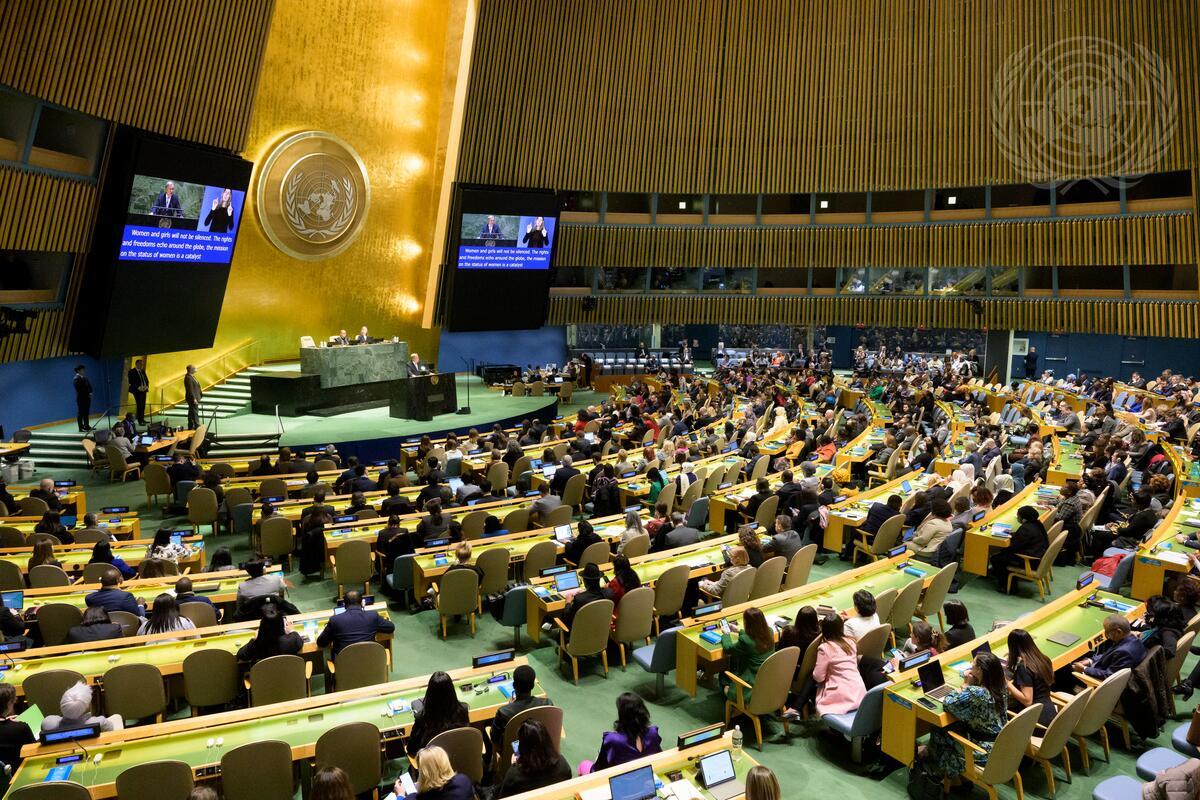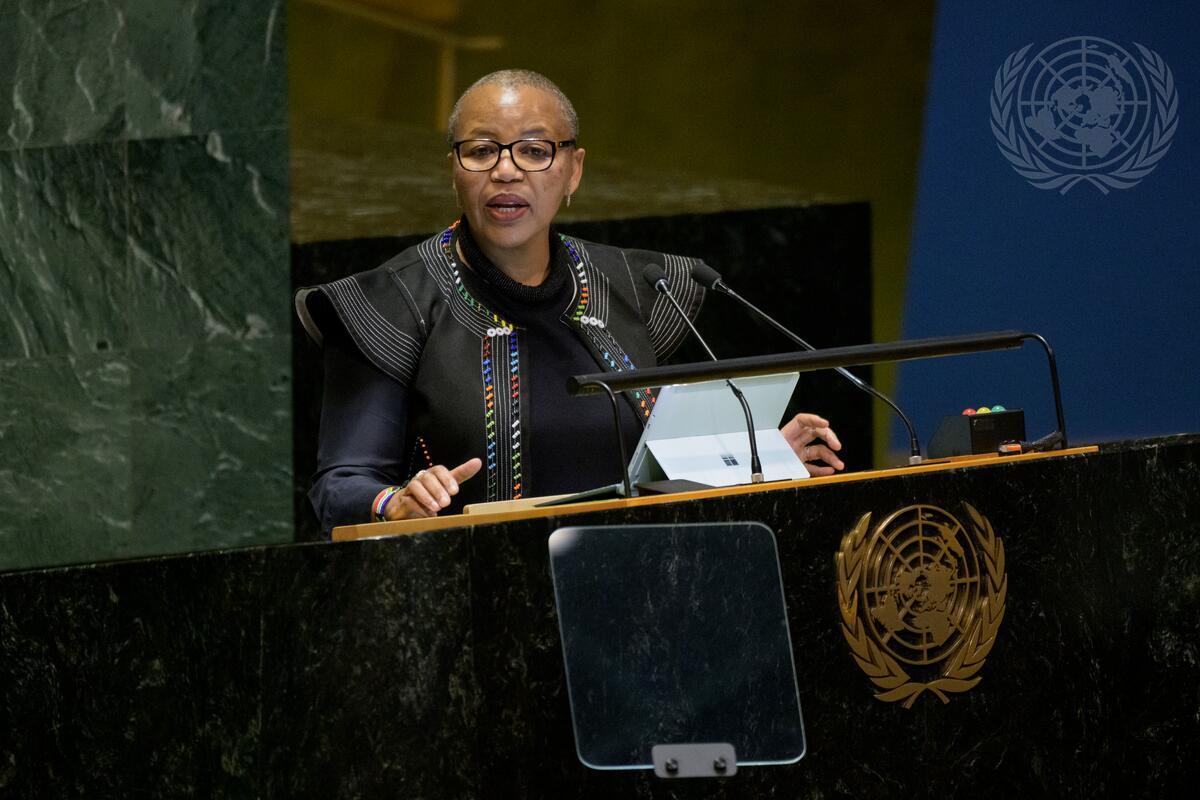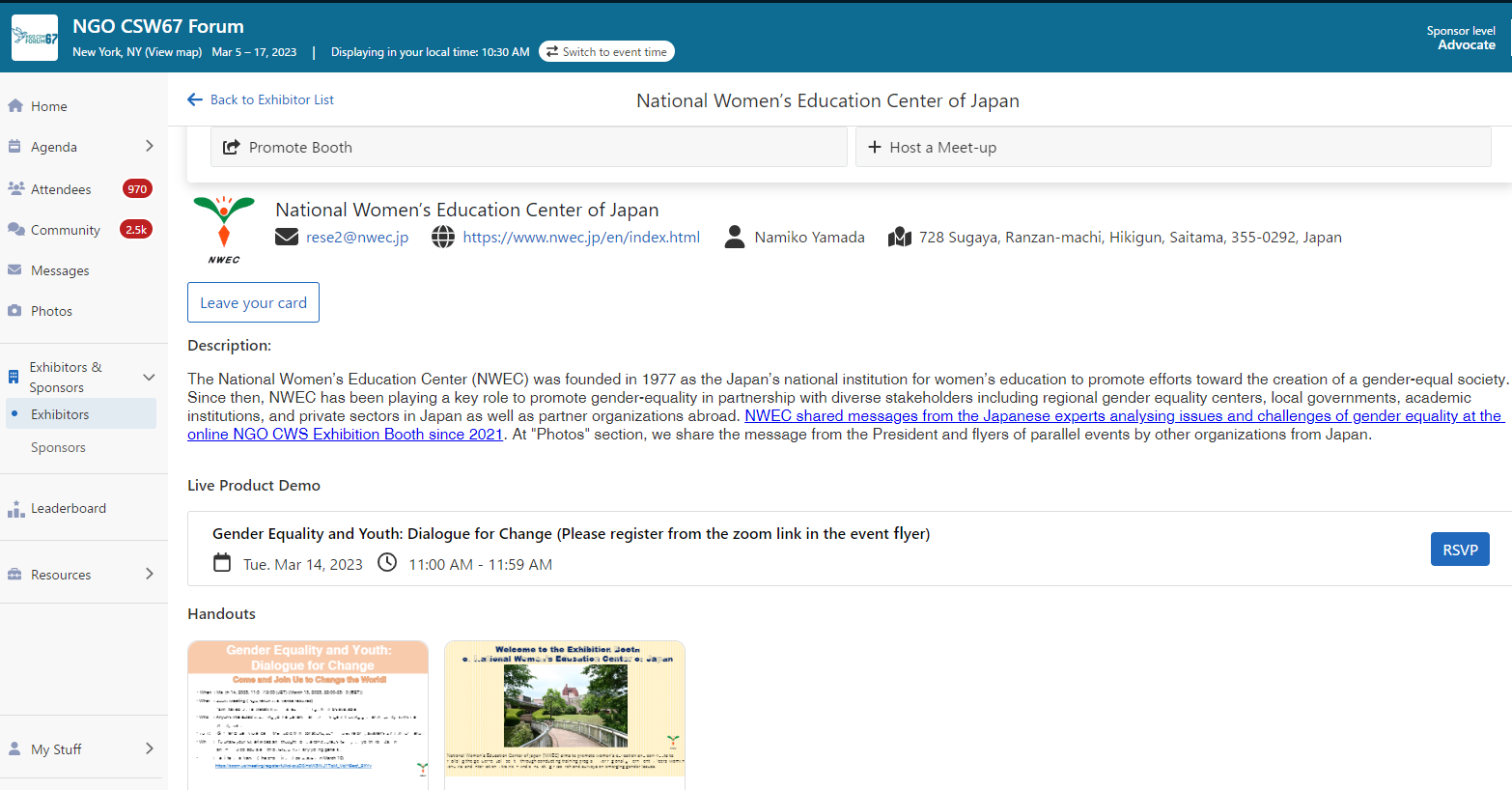International Conference/International Exchange
- HOME
- International Cooperation
- International Conference/International Exchange
- The 67th Session of the Commission on the Status of Women
International Conference/International Exchange
- CSW
-
The 67th Session of the Commission on the Status of Women
Date:March 6 to 17, 2023
The sixty-seventh Session of the Commission on the Status of Women (CSW67) was held from March 6 to 17, 2023.
Overview of CSW67
The sixty-seventh Session of the Commission on the Status of Women was held at the United Nations Headquarters in New York City. 181 delegates including heads of state and ministerial government officials from UN member states and observers gathered for the session. Focusing on the priority theme of “Innovation and technological change, and education in the digital age for achieving gender equality and the empowerment of all women and girls” and the review theme, "Challenges and opportunities in achieving gender equality and the empowerment of rural women and girls,” (agreed conclusions of CSW62), ministerial round tables, interactive dialogues, and interactive expert panels were held. CSW has addressed issues such as women’s access to information technology and communication networks in its previous sessions. This year’s priority theme also focused on the digital divide, transparency in digital technology, inclusion of diversity in digital technology development, ethics in digital field, and gender-based harassment and violence in the digital world. Also, of note this year was the inclusion of an interactive dialogue with youth in the plenary session.

Opening Ceremony at UN Headquarters
(Photo: UN Photo/Manuel Elías)

H.E. Ms. Mathu Joyini (South Africa),
Chair of the CSW67
(Photo: UN Photo/Manuel Elías)
Statements from the Government of Japan
From Japan, at the general discussion (held on the 6th), OGURA Masanobu, Minister of State for Gender Equality and Minister in charge of Women’s Empowerment, gave a statement in the form of a video message. In his statement, he emphasized the importance of realizing “women’s economic empowerment” through promoting the shift of industries and occupations to the digital sector. To this end, Japan has formulated the “Digital Human Resources Development Plan for Women” and is working to improve digital skills and promote labor mobility into the digital sector, and in cooperation with universities, the business community, etc., create opportunities for female students to develop an interest in science and technology and promote understanding among female students, parents, teachers, and others regarding career choices in science, technology, engineering, and mathematics (STEM) fields.
At the ministerial round table (held on the 7th), TANAKA Yumiko, Representative of Japan, made a statement about progress in information and communication technology (ICT) education at elementary and middle schools and provided cases of how Japan has supported training of Syrian refugee women in basic ICT skills through UN Women.
At the interactive youth dialogue (on the 13th), the youth representative of Japan made a statement on the need for creating a safe environment online and offline and emphasized the importance of gender statistics and mental health support.
At the interactive dialogue (on the 16th), it was mentioned that the use of digital technology and flexible work styles were promoted as Covid-19 spread.
On the 8th, the Permanent Mission of Japan to the United Nations and three of Japan women’s NGOs (Japan Women’s Watch, National Women’s Committee of the United Nations NGOs, and International Women’s Year Liaison Group) co-hosted a side event, “Transforming Innovation and Technology to Empower Women and Girls: Is Establishing New Faculties of Engineering at Women’s Universities the Panacea for Gender Equality?”
Review Theme
Every year, topics discussed at previous CSW sessions are taken up as review themes, and their state of progress is gauged. This year there was a report and Q&A session on the challenges and opportunities for achieving gender equality and empowerment of women and girls in rural areas, as agreed in the conclusions of CSW62. According to the report of the UN Secretary-General, it was confirmed that during the last five years among member states aiming for implementation of the agreed conclusions, there has been a strengthening of programs and various measures for the empowerment of women and girls in rural areas. On the other hand, it was also pointed out that the Covid-19 pandemic, climate change, and rising prices of food, fuel, etc., are hindering women’s participation in society. Empowerment of women and girls in rural areas, including indigenous peoples, and gender-based violence continue to be challenged. Countries reported measures implemented through public-private partnerships such as measures for land ownership and management by women, improving access to finance, promotion of small businesses development such as agri-processing, training to equip women and girls with skills including information technology, and educational support for women who have dropped out of school due to pregnancy or other reasons.
Agreed Conclusions
The Economic and Social Council determined that the results of discussions on the theme for that year should be summarized in the form of ‘agreed conclusions.’ Negotiations of the texts of the agreed conclusions was a lengthy process. On the late hour of last day of the Session, agreed conclusions comprising 89 paragraphs and eight resolutions and decisions were adopted.
At the closing ceremony, Executive Director for UN Women stated that the agreed conclusions for this year were game-changing and called on member states to act collectively to promote a more equal and connected world for women and girls in all their diversity.
The agreed conclusions reaffirmed the importance of ensuring full and effective women’s participation and equal opportunity for leadership by women in the STEM fields while expressing extremely deep concern that only modest progress has been made in closing the gender gaps in access to and use of technology and about online violence and harassment. The Commission called for increased public and private sector investments to bridge the gender digital divide, more inclusive innovation eco-systems, and the promotion of safe and gender-responsive technology and innovation. It also called for inclusive and equitable quality education in science, technology, engineering, and mathematics, information and communications technology and digital literacy to ensure that all women and girls can thrive in a rapidly changing world. To end gender-based violence using technology, it called on governments and businesses to prioritize its prevention and elimination.
At this session of CSW, many government representatives and civil organizations expressed grave concerns about online violence and hate speech against women and girls, human rights violations against women and girls in disaster- and conflict-affected areas, and the need to strengthen protection for all women and girls.
NGO CSW67 NWEC Exhibit Booth
During the Session, efforts by civil society organizations to improve the status of women are actively reported and discussed every year. This year’s NGO CSW/NY prepared venues inside and outside the UN Building and an online platform and a number of events related to priority and review themes were held. More than 750 events were held including parallel events hosted by Japanese organizations.
The National Women’s Education Center (NWEC) also opened a virtual exhibition booth on the online platform to distribute information about the work of NWEC. The booth featured a greeting from the President of NWEC, the leaflet of gender statistics and other materials introducing NWEC’s activities as well as flyers of parallel events, etc., hosted by Japanese organizations.
NGO CSW67 NWEC Booth

In addition, a virtual open house and an event, “Gender Equality and Youth: Dialogue for Change,” were held.
The Virtual Open House was held three times during the event, introducing the activities of NWEC and providing an opportunity for participants to exchange opinions and network on topics such as violence against women, the role of women’s center, gender statistics, etc.
On the 14th, the event, “Gender Equality and Youth: Dialogue for Change,” was held. At this event, young people working on gender issues around them gave presentations on what motivated them to action, how they could work together with schools, businesses, men, etc., toward gender equality, and their outlook for the future.
International Cooperation
- International Seminar
- FY2019 Seminar for Gender Equality Officers and Women Leaders in the Asia Region
- FY2018 Seminar for Gender Equality Officers and Women Leaders in the Asia Region
- FY2017 Seminar for Gender Equality Officers and Women Leaders in the Asia Region
- FY2016 Seminar for Gender Equality Officers and Women Leaders in the Asia Region
- FY2015 Seminar for Gender Equality Officers and Women Leaders in the Asia Pacific Region
- FY2014 Seminar for Gender Equality Officers and Women Leaders in the Asia Pacific Region
- FY2013 Seminar for Gender Equality Officers and Women Leaders in the Asia Pacific Region
- FY2012 Seminar for Gender Equality Officers and Women Leaders in the Asia Pacific Region
- FY2011 Seminar for Gender Equality Officer and Women Leaders in the Asia Pacific Region
- FY2010 Empowerment Seminar for Women Leaders in the Asia Pacific Region
- FY2009 Empowerment Seminar for Women Leaders in the Asia Pacific Region Final Report
- FY2008 Empowerment Seminar for Women Leaders in the Asia Pacific Region
- FY2007 Empowerment Seminar for Women Leaders in the Asia Pacific Region
- FY2006 Empowerment Seminar for Women Leaders in the Asia Pacific Region
- NWEC Global Seminar
- FY2025 NWEC Global Seminar: Addressing Technology-Facilitated Gender Based Violence (TFGBV): Approaches to Eradicate the Invisible Harm
- FY2024 NWEC Global Seminar: Gender Equality and Care
- FY2023 NWEC Global Seminar: Gender Mainstreaming & Strengthening Institutional Mechanism with Gender Perspective
- FY2022 NWEC Global Seminar: Does Digital Technology Advance Gender Equality?
- FY2021 NWEC Global Seminar: Combating Gender-Based Violence – “Building Back Better” from the Covid-19 Crisis
- FY2020 NWEC Global Seminar: Covid-19 and Gender
- FY2019 NWEC Global Seminar: Gender and Media
- FY2018 NWEC Global Seminar: Promotion of the Advancement of Women - What Japan can learn from Iceland about Gender Equality?
- FY2017 NWEC Global Seminar: Promotion for Advancement of Women Lessons from Germany
- FY2016 NWEC Global Seminar: Promotion for Advancement of Women –Lessons from Europe
- FY2015 International Symposium: Gender Equality and Women's Empowerment
- FY2014 International Symposium: Keys to Diversity and Women's Leadership
- FY2013 NWEC International Symposium:Gender Equality for Men
- FY2012 NWEC International Symposium:To Make a Society without Violence against Women a Reality
- FY2011 NWEC International Symposium
- FY2010 International Forum for Women's Empowerment
- FY2009 International Forum for Women's Empowerment
- FY2008 International Forum for Women's Empowerment Final Report3
- FY2008 International Forum for Women's Empowerment Final Report2
- FY2008 International Forum for Women's Empowerment Final Report1
- Cooperation with JICA
- FY2025 Knowledge Co-Creation Program (KCCP): "Promotion of Global Networking on Anti-Trafficking in Persons"
- FY2025 Knowledge Co-Creation Program "Eradicating Sexual and Gender-Based Violence (SGBV)"
- FY2025 Knowledge Co-Creation Program: Bangladesh “Strengthening Capacity to Address Gender-Based Violence"
- FY2024 Knowledge Co-Creation Program on "Promotion of Global Networking on Anti-Trafficking in Persons"
- FY2024 Knowledge Co-Creation Program "Eradicating Sexual and Gender-Based Violence (SGBV)"
- FY2023 Knowledge Co-creation Program "Promotion of Networking among ASEAN Countries on Anti-Trafficking in Persons”
- FY2023 Knowledge Co-Creation Program "Eradicating Sexual and Gender-Based Violence (SGBV)"
- FY2022 Knowledge Co-creation Program "Promotion of Networking among ASEAN Countries on Anti-Trafficking in Persons”
- FY2022 Knowledge Co-Creation Program "Eradicating Sexual and Gender-Based Violence (SGBV)"
- FY2021 Knowledge Co-creation Program "Promotion of Networking among ASEAN Countries on Anti-Trafficking in Persons”
- FY2020 Knowledge Co-creation Program "Promotion of Networking among ASEAN Countries on Anti-Trafficking in Persons”
- FY2019 Knowledge Co-creation Program "Promotion of Networking among ASEAN Countries on Anti-Trafficking in Persons”
- FY2018 Knowledge Co-creation Program "Promotion of Networking among ASEAN Countries on Anti-Trafficking in Persons”
- Issue-specific Training “Seminar on Promotiom of Networking among ASEAN Countries on Anti-Trafficking in Persons”
- Basic Information-Gathering Survey/Workshop Seminar on the Economic Independence for Women in Central America and the Caribbean (El Salvador/Dominican Republic)
- Regional Gender Seminar in Central and South America
- 2015 Issue-specific Training "Seminar on Promotion of Networking among Asian Countries on Anti-Trafficking in Persons"
- Seminar on the Promotion of Education for Girls and Women II
- International Conference/International Exchange
- Online meeting with Seisen International School elementary students
- Visitor: Mansfield Fellows
- Visitor:JICA Knowledge Co-Creation Program (KCCP) on "Women's Empowerment through Business for Central American Integration System (SICA) Member Countries"
- The 68th Session of the Commission on the Status of Women
- Visitor: Madam Sustjie Mbumba, First Lady of the Republic of Namibia
- Workshop of commemorating the donation of the Beate Shirota Gordon archive materials
- Meeting with Korean Women’s Development Institute (KWDI)
- The Coalition of Finnish Women's Associations (NYTKIS) Secretary General Ms. KAKKOLA’s Courtesy Call to Foreign Minister KAMIKAWA
- The Coalition of Finnish Women's Associations (NYTKIS) Secretary General Ms. KAKKOLA’s Japan Visit Program
- The 67th Session of the Commission on the Status of Women
- NGO CSW67 Forum
- Webinar with Korean Women’s Development Institute (KWDI)
- The 66th Session of the Commission on the Status of Women (Hybrid format)
- Online meeting with international graduate students from the Appropriate Technology course at the University of Tsukuba
- The 65th session of the Commission on the Status of Women
- Lecture "The Beate Sirota Gordon Archives at Mills College"
- Participation in 2nd AGenT
- The 64th session of the Commission on the Status of Women
- Dr. Wang from National Taiwan University visits NWEC
- Japan Network of Women Engineers and Scientists and The Japan Inter-Society Liaison Association Committee for Promoting Equal Participation of Men and Women in Science and Engineering: 9th Japan Korea China Women Leaders Forum for Science & Technology
- Researcher from the KWDI visits NWEC
- Visit by a delegation from the Socialist Republic of Vietnam Ministry of National Defense
- Briefing on the Reykjavik Index for Leadership
- Women's Archives Center Exhibition "Beate Sirota Gordon and gender equality in Japanese Constitution"
- Visit from the Guangxi Women’s Federation
- Participation in the 63rd Session of the Commission on the Status of Women
- 7th Global Forum on Gender Statistics
- FY2018 International Symposium hosted by Korean Institute for Gender Equality Promotion and Education “Gender Equality at Schools”
- Visit from All-China Women’s Federation(ACWF)
- Participation in the 62nd Session of the Commission on the Status of Women
- The 14th KIGEPE International Symposium “Empowering Women’s Leadership: expanding influence and innovation”
- Participation in the 61st Session of the Commission on the Status of Women
- Visit from the Batis Center for Women
- 2011 Asia Women Eco-Science Forum (a forum of science and engineering leaders in Japan, China and Korea)
- The 60th Session of the Commission on the Status of Women
- The 59th Session of the United Nations Commission on the Status of Women
- The 58th Commission on the Status of Women
- The 57th Session of the United Nations Commission on the Status of Women
- International Symposium: Gender Awareness Education for Sustainable Development
- Thirtieth Anniversary Programs
- Attendance at the Ceremony Commemorating the 25th Anniversary of the Korean Women’s Development Institute (KWDI)
- Japanese-Filipino children (JFC)* from the Philippines-based NGO “DAWN” visit the Center
- Visitors from Abroad to NWEC
- Research report on Multicultural Family Support in South Korea
- Workshop on Gender and Education: Life-long Learning for Women’s Empowerment
- Lecture Delivered by a Visiting Researcher
- Connections: Bringing Together the Next Generation of Women Leaders in Science, Technology, Engineering and Mathematics
- Conclusion of Memorandum of Understanding on Exchange and Cooperation with the Ministry of Women's Affairs, Royal Government of Cambodia
- Visit to Japan by the Minister of Women’s Affairs of the Royal Government of Cambodia
- KIGEPE Delegation Visit
- Officials of Ministry of Information and Communications of the Socialist Republic of Vietnam visited NWEC
- The 56th Commission on the Status of Women
- Dr. Barker's visit
- Multidisciplinary Intellectual Exchange for Women Leaders from the United States, Japan, South Korea and the Philippines
- Courtesy visit to University of Hawai`i
- Delegation of Board for the Advancement of Women, Ministry of Finance of the Socialist Republic of Vietnam visited NWEC
- Visit Korean Women's Development Institute (KWDI)
- Report on Participation in the 5th World Social Forum on Migration
- A group led by the Vice President of the Korean Women's Development Institute visited NWEC
- A disaster management specialist from India visits the Center
- Visit to the Korean Institute for Gender Equality Promotion & Education (KIGEPE) and others
- Secretary of State, Ministry of Justice, Kingdom of Cambodia visited NWEC
- Research conducted in the Republic of the Philippines
- Research on the Comparative Study of the Gender Equality Policy in Southeast Asian Countries in the Kingdom of Cambodia
- Ochanomizu University and A Canadian Women’s Study Researcher visited NWEC
- Aigyung Yang, Research Fellow and Former Director of Strategy Board for Women Friendly Policies of the Korean Women's Development Institute (KWDI) Visits NWEC
- Delegation of the Ministry of Defense of the Socialist Republic of Vietnam visited NWEC
- Delegation from the Women and Development Center, of the Vietnam Women's Union, Visited NWEC
- The "7th Asia-Pacific Forum on Development and Gender" was held in Seoul, South Korea
- HOME
- International Cooperation
- International Conference/International Exchange
- International Conference/International Exchange
- The 67th Session of the Commission on the Status of Women


